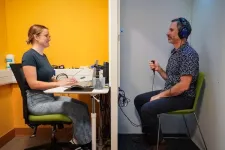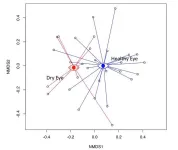(Press-News.org) The world-leading Dunedin Study is set to launch its age 52 assessments, delving into an understudied but important period of life and time of change.
The Dunedin Multidisciplinary Health and Development Study is a longitudinal study that follows the lives of 1037 babies born in Queen Mary Maternity Hospital between 1 April 1972 and 31 March 1973. It is the most detailed study of human health and development in the world.
Members have been assessed regularly throughout their lives, most recently at age 45.
Study Director, Research Professor Moana Theodore is incredibly excited to start the age 52 assessments on 8 April.
“Midlife is an understudied period of time when it comes to understanding health and wellbeing,” Professor Theodore says.
Research often focuses on childhood or old age, leaving a gap in information about people in the middle part of their lives and how their health is shaped by their early lives and will affect how they age.
“Not only is it a time of change – people’s children may be leaving home and their parents are getting older – but it’s also when significant health issues can arise,” she says.
“Chronic conditions emerge at earlier ages for some of our communities who have less access to services and experience inequities in health. The best way to study inequities is to identify lifecourse pathways that create them to inform programmes that address inequities now and for future generations.”
By adding the new age-52 data to the information gathered from Study members in their 30s and 40s, researchers will be in a rare position to understand how people age.
“Why that’s so important is because we have an ageing population. Some of our most pressing healthcare, social, and economic issues relate to how we best support and care for people as they age.”
The assessments will take about two years to complete. Study members will undergo a range of physical tests including a dental examination, vision, hearing and respiratory tests, and will answer many questions about their lives. They will also attend a brain MRI scan on a second day.
Professor Theodore says researchers ensure as many members can participate as possible, bringing them to Dunedin from all over the world. Incredibly, 94 per cent of all living members took part in the age 45 assessments, making it the highest follow-up rate for a study of this design and duration in the world.
This is what sets it apart from other longitudinal studies, she says.
“The Study members come from all walks of life. Our high retention rate gives us the ability to look at the wide range of human experiences.
“The fact that we have this world-leading study right here in Aotearoa New Zealand is something that we should all be incredibly proud of. But it is only possible due to the generosity of each and every one of our Study members and their families.
“The Study members are the true heroes of this Study. They have given half a century of service to their country. In recognition of their contribution, they each anonymously received a Civic Award from the City of Dunedin in 2010, and a copy of the Study’s 2016 Prime Minister’s Science Prize certificate. The Study itself was also awarded the Rutherford Medal in 2022, the most prestigious national research award.”
The last time the Study members were seen was before the COVID-19 pandemic and the Study is in a unique position to examine how people’s lives have changed since then. The Study is also increasing its focus on how the environment impacts of health. New technologies will look at Study members’ exposure to chemical toxins like pesticides, air pollution, and heavy metals.
Those are just some of the things that have changed since the last assessments. Professor Theodore was named Director in October 2023, after the untimely passing of former Director Emeritus Distinguished Professor Richie Poulton.
Professor Theodore is only the third Director in 51 years, and the first Director who is Generation X, the same age as the Study members.
“Like many New Zealand students and researchers, I have been fortunate to learn and train at the Study. Richie was a long-time mentor of mine. He knew that the data that we collect would become more and more valuable and helpful over time - that the best years of the Study were still to come.
“I work alongside a team of staff who will ensure we build upon the Study’s legacy. A team that is absolutely committed to the Study and the Study members and working alongside internationally renowned researchers across such a broad range of multidisciplinary areas.”
One of those leading researchers is the Study’s Associate Director Professor Terrie Moffitt. Professor Moffitt, who is based at Duke University in North Carolina, says the Study has had a significant impact internationally.
“The Study has from the outset aimed first to improve health in New Zealand,” she says. “But it is also well-regarded as a trusted source of health information overseas.”
Professor Moffitt says the measures used in the Study are the same quality used in clinics and its findings are published in top international medical journals.
“Most studies just stay on the surface, they send out postal questionnaires, or collect saliva through the post, or collect data over the internet. But each and every Dunedin Study member spends a whole day in person, at the Unit, being assessed in depth.”
END
How will you age? World-leading Dunedin Study launches next phase
2024-03-27
ELSE PRESS RELEASES FROM THIS DATE:
Opportunistic emergency department stop smoking prompt helps smokers quit
2024-03-27
An opportunistic emergency department stop smoking prompt, comprising brief advice by a trained professional, an e-cigarette starter kit, and referral to local stop smoking services can help smokers quit, with a significant proportion of them still not smoking 6 months later, finds research published online in Emergency Medicine Journal.
Some 6.4 million people in the UK still haven’t stubbed out for good, and of the large numbers of people attending emergency departments, a substantial proportion are more likely to be smokers and have poorer overall health, explain ...
Consistently exercising 2-3 times a week over the long term linked to lower current insomnia risk
2024-03-27
Consistently exercising 2-3 times a week over the long term is linked to a lower current risk of insomnia as well as the ability to clock up the recommended 6-9 hours of shut eye every night, suggests an international 10-year study published in the open access journal BMJ Open.
Regular exercise is associated with better overall health, and several studies have suggested that physical activity promotes better quality sleep and may improve symptoms of chronic insomnia, note the researchers.
But it’s not entirely clear how much gender, age, weight (BMI), overall fitness, general health and exercise ...
Handing out vapes in A&E helps smokers quit
2024-03-27
Peer reviewed – randomised controlled trial - humans
Giving out free e-cigarette starter packs in hospital emergency departments to people who smoke helps more people quit – according to research from the University of East Anglia.
The trial, funded by the National Institute for Health and Care Research (NIHR), offered advice, an e-cigarette starter pack and referral to stop smoking services to people attending A&E for any reason, to help them to stop smoking.
Six months later, almost one in four people given the starter packs said they had quit smoking. And those who received ...
Shared digital NHS prescribing record could avoid nearly 1 million annual drug errors
2024-03-27
Implementing a single shared digital prescribing record across the NHS in England could avoid nearly 1 million drug errors every year, stopping up to 16,000 fewer patients from being harmed, and saving up to 22 lives every year, suggests a modelling study, published online in BMJ Quality & Safety.
The figures, which are based on the assumption that such a system could reduce medication errors by at least 10%, and by as much as 50%, could also save £millions for the NHS, say the researchers.
Previously published research suggests that drug errors cost the NHS £98 ...
Stanford Medicine-designed AI tools tackle soft tissue sarcomas, identify new treatment strategies
2024-03-26
Using novel machine learning tools developed at Stanford Medicine, researchers have mapped three distinct cellular configurations that correspond to clinical outcomes for patients with a rare, difficult-to-treat cancer called soft tissue sarcoma.
In particular, the technique identified a cellular neighborhood that correlated with a positive response to immunotherapy, which may help physicians make treatment decisions.
“These cancers are challenging,” said Everett Moding, MD, PhD, an assistant professor of radiation oncology. “Up to half of patients diagnosed with a primary tumor will develop distant metastases, but we don’t have a good way to predict ...
ARPA-H awards Columbia researchers nearly $39M to develop a living knee replacement
2024-03-26
A team of researchers from Columbia University Irving Medical Center (CUIMC) and Columbia Engineering has been awarded up to a $38.95 million contract from the Advanced Research Projects Agency for Health (ARPA-H) to build a living knee replacement from biomaterials and human stem cells, including a patient’s own cells. ARPA-H is a federal funding agency that funds transformative biomedical and health research breakthroughs, rapidly translating research from the lab to applications in the marketplace.
The Award
The award, part of the ARPA-H’s Novel Innovations for Tissue Regeneration ...
How genes work together to shape how much you smoke
2024-03-26
Take a puff of nicotine for the first time, and your DNA plays an important role, alongside social and environmental factors, in shaping what happens next.
In recent years, scientists have identified thousands of genetic variants believed to influence everything from when people first try smoking to how good that first cigarette feels to how often they light up and how hard it is to quit. Some variants influence how quickly we metabolize nicotine, while others underlie how sensitive we are to it. But little is known about how they interact with each other and with other genetic differences.
A new University of Colorado Boulder study sheds unprecedented ...
University of Oklahoma engineer receives NSF CAREER Award to advance gas sensing technologies
2024-03-26
NORMAN, OKLA. – Binbin Weng, Ph.D., an engineering professor at the University of Oklahoma, has been awarded a National Science Foundation CAREER Award presented to early-career faculty with the potential to serve as academic role models in research and education. The $497,370 grant will fund his project “Enabling New States of Light in Mid-Wave Infrared Photonics for Gas Sensing Applications.”
Weng says there is a growing demand for distributed gas sensing networks capable of continuously monitoring gas threats on a broad scale. However, current technologies face significant challenges in size, power consumption ...
More than meets the eye: Researchers uncover the microbial secrets of dry eye
2024-03-26
Researchers have used advanced sequencing technology to determine how the mix of microbes present in patients with healthy eyes differs from the mix found in patients with dry eye. The new work could lead to improved treatments for various eye problems and for diseases affecting other parts of the body.
Microbial communities in and on our body — collectively referred to as the human microbiota — play an essential role in keeping us healthy. Although many studies have focused on microbial communities in our gut, understanding the microbiota present in other body sites is critical for advancing our knowledge of human health and developing targeted interventions ...
Researchers identify microbes that help plants thwart parasite
2024-03-26
Bacteria that could help one of Africa’s staple crops resist a major pest have been identified by researchers at the University of California, Davis. Their findings, published March 26 in Cell Reports, could improve yields of sorghum, a mainstay of food and drink in West and East African countries.
About 20 percent of Africa’s sorghum crop is lost due to witchweed (Striga hermonthica), a parasitic plant that steals nutrients and water by latching onto the plant’s roots.
In the new study, UC Davis researchers show that soil microbes induce changes in sorghum roots that make the plant more resistant to infection by witchweed. They ...






